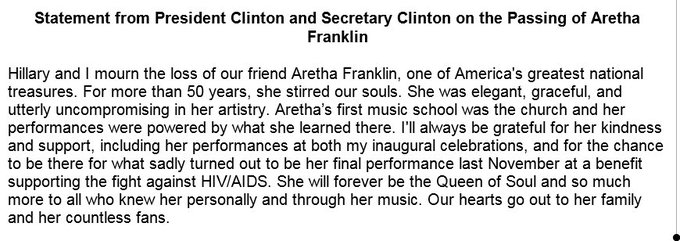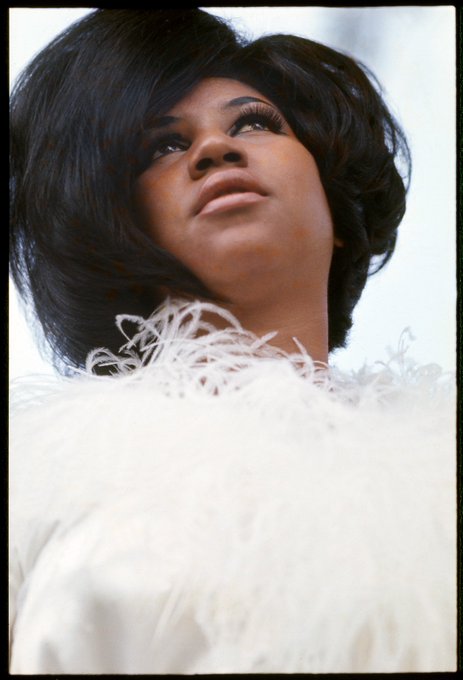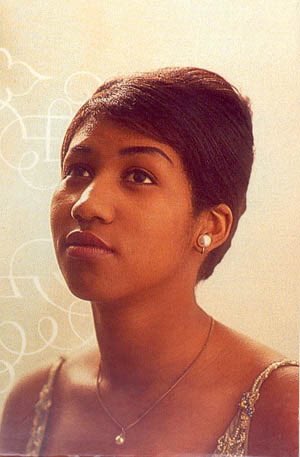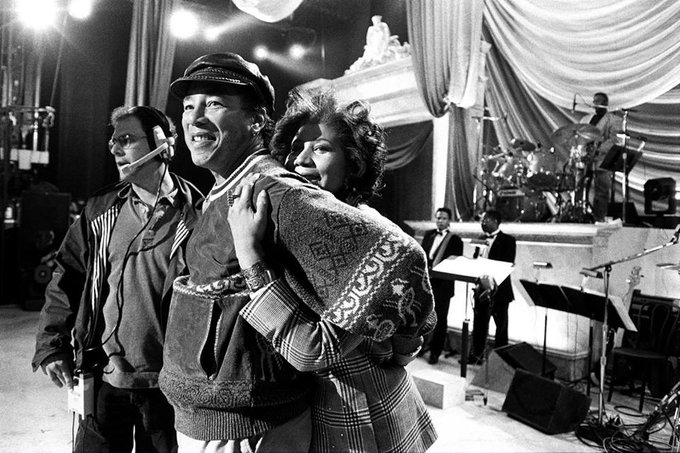Aretha Franklin, the Queen of Soul, passed away on Aug. 16. She was 76 years old.
The cause was advanced pancreatic cancer.
Publicist Gwendolyn Quinn tells The Associated Press through a family statement that Franklin passed Thursday at 9:50 a.m. at her home in Detroit.
The statement said “Franklin’s official cause of death was due to advance pancreatic cancer of the neuroendocrine type, which was confirmed by Franklin’s oncologist, Dr. Philip Phillips of Karmanos Cancer Institute” in Detroit.
The family added: “In one of the darkest moments of our lives, we are not able to find the appropriate words to express the pain in our heart. We have lost the matriarch and rock of our family. The love she had for her children, grandchildren, nieces, nephews, and cousins knew no bounds.”
WATCH BELOW: A look at Aretha Franklin’s life.
The statement continued: “We have been deeply touched by the incredible outpouring of love and support we have received from close friends, supporters and fans all around the world. Thank you for your compassion and prayers. We have felt your love for Aretha and it brings us comfort to know that her legacy will live on. As we grieve, we ask that you respect our privacy during this difficult time.”
Funeral arrangements will be announced in the coming days.
Franklin, the long-reigning Queen of Soul who sang with matchless style on such classics as Think and her signature song, Respect, was originally diagnosed with cancer in 2010.
WATCH: People lay flowers at Aretha Franklin’s Hollywood Walk of Fame star
Condolences started pouring in on Twitter once news of her passing spread.
“If you hear a song like Respect on the radio, that rippled through society in a way that a song being released today would never do,” Global News music commentator Alan Cross said.
Cross continued: “There is not a female singer in the soul, rock, R&B, hip-hop genre that doesn’t owe something to Aretha Franklin. We can go with Whitney Houston, we can go with Beyoncé, we go can with Mariah Carey, We can go with Lauryn Hill, the list is absolutely endless. All these people looked up to the way Aretha did things and the way she sang.”
“This was the era before auto tune and studio trickery, it was just pure voice and pure emotion with no tweaking at the source,” Cross said.
Franklin, who was born March 25, 1942, in Memphis, TN, announced her retirement from touring in 2017.
The Natural Woman singer stepped on stage for the last time in June 2017 in Detroit at the city’s inaugural Detroit Music Weekend.
She performed a medley of fan favourites on Aretha Franklin Way and received the key to the city of Detroit.
A professional singer and accomplished pianist by her late teens, a superstar by her mid-20s, Franklin had long ago settled any arguments over who was the greatest popular vocalist of her time. Her gifts, natural and acquired, were a multi-octave mezzo-soprano, gospel passion and training worthy of a preacher’s daughter, taste sophisticated and eccentric, and the courage to channel private pain into liberating song.
WATCH: People gather outside Aretha Franklin’s childhood home in Memphis to honour Queen of Soul
She recorded hundreds of tracks and had dozens of hits over the span of a half century, including 20 that reached No. 1 on the R&B charts. But her reputation was defined by an extraordinary run of top 10 smashes in the late 1960s, from the morning-after bliss of (You Make Me Feel Like) A Natural Woman, to the wised-up Chain of Fools to her unstoppable call for Respect.
Her records sold millions of copies and the music industry couldn’t honour her enough. Franklin won 18 Grammy awards. In 1987, she became the first woman inducted into the Rock and Roll Hall of Fame.
Fellow singers bowed to her eminence and political and civic leaders treated her as a peer. The Rev. Martin Luther King Jr. was a longtime friend, and she sang at the dedication of King’s memorial, in 2011. She performed at the inaugurations of U.S. Presidents Bill Clinton and Jimmy Carter, and at the funeral for civil rights pioneer Rosa Parks. Clinton gave Franklin the National Medal of Arts. Former U.S. President George W. Bush awarded her the Presidential Medal of Freedom, the nation’s highest civilian honour, in 2005.
Franklin’s best-known appearance with a president was in January 2009, when she sang My Country ’tis of Thee at Barack Obama’s inauguration. She wore a grey felt hat with a huge, Swarovski rhinestone-bordered bow that became an Internet sensation and even had its own website. In 2015, she brought Obama and others to tears with a triumphant performance of Natural Woman at a Kennedy Center tribute to the song’s co-writer, Carole King.
“American history wells up when Aretha sings,” Obama said in 2015. “Nobody embodies more fully the connection between the African-American spiritual, the blues, R&B, rock and roll — the way that hardship and sorrow were transformed into something full of beauty and vitality and hope.”
She only released a few albums over the past two decades, including A Rose is Still a Rose, which featured songs by Sean (Diddy) Combs, Lauryn Hill and other contemporary artists, and So Damn Happy, for which Franklin wrote the gratified title ballad. Franklin’s autobiography, Aretha: From These Roots, came out in 1999, when she was in her 50s. But she always made it clear that her story would continue.
“Music is my thing, it’s who I am. I’m in it for the long run,” she told The Associated Press in 2008. “I’ll be around, singing, ‘What you want, baby I got it.’ Having fun all the way.”
She was married from 1961 to 1969 to her manager, Ted White, and their battles are widely believed to have inspired her performances on several songs, including (Sweet Sweet Baby) Since You’ve Been Gone, Think and her heartbreaking ballad of despair, Ain’t No Way. The mother of two sons by age 16 (she later had two more), she was often in turmoil as she struggled with her weight, family problems and financial predicaments. Her best known producer, Jerry Wexler, nicknamed her “Our Lady of Mysterious Sorrows.”
Franklin married actor Glynn Turman in 1978 in Los Angeles but returned to her hometown of Detroit the following year after her father was shot by burglars and left semi-comatose until his death in 1984. She and Turman divorced that year.
She is survived by her four sons Clarence Franklin, Edward Franklin, Ted White Jr. and Kecalf Cunningham.
— With files from The Associated Press and Chris Jancelewicz




























Comments
Post a Comment